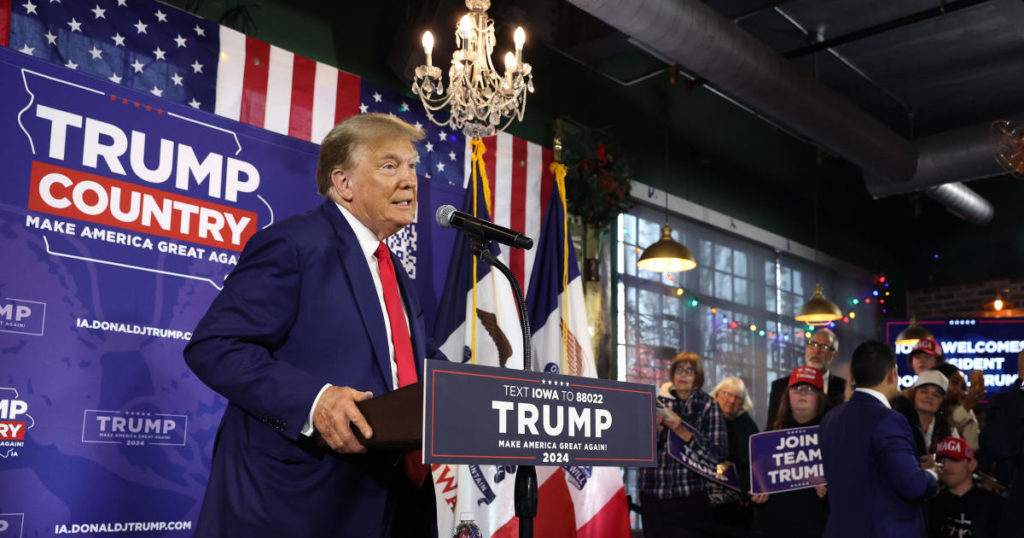The Colorado Supreme Court ruled on Tuesday that former President Donald Trump is not eligible for the White House according to the U.S. Constitution’s insurrection clause. As a result, he has been removed from the state’s presidential primary ballot. This decision sets the stage for a potential showdown in the nation’s highest court to determine whether the front-runner for the GOP nomination can continue his campaign.
This is the first instance in history where Section 3 of the 14th Amendment has been employed by a court, whose justices were all appointed by Democratic governors, to disqualify a presidential candidate.
The court’s decision states that Trump is disqualified from holding the office of president under Section 3 of the 14th Amendment, with a majority of the court in agreement.
The Colorado Supreme Court has reversed a decision made by a district court judge regarding Trump’s alleged incitement of an insurrection during the attack on the Capitol on January 6, 2021. The Supreme Court determined that Trump cannot be disqualified from the ballot as it is uncertain whether the provision in question applies to presidential candidates.
The court has temporarily suspended its decision until Jan. 4, or until the U.S. Supreme Court makes a ruling on the case.
The court’s majority expressed that they did not come to these conclusions without careful consideration. We acknowledge the significance and gravity of the questions currently facing us. We are fully aware of our responsibility to impartially enforce the law, unaffected by public opinion or external pressures, in order to make decisions that align with the law’s requirements.
The attorneys representing Trump had made a commitment to promptly appeal any disqualification to the highest court in the country, which holds the ultimate authority on constitutional matters.
“The decision made by the Colorado Supreme Court tonight is deeply flawed, and we will take immediate action by filing an appeal to the United States Supreme Court. We will also request a stay to challenge the undemocratic nature of this ruling,” stated Steven Cheung, spokesperson for the Trump campaign, on Tuesday night.
In 2020, Trump lost Colorado by a margin of 13 percentage points. However, winning the state is not crucial for his success in the upcoming presidential election. However, there is a concern for the former president that additional courts and election officials may adopt Colorado’s approach and prevent Trump from participating in crucial states.
According to Colorado officials, it is crucial to resolve the matter by Jan. 5, as this is the deadline for the state to print its presidential primary ballots.
Numerous lawsuits have been filed across the country in an effort to disqualify Trump under Section 3, a provision aimed at preventing former Confederates from reentering government following the Civil War. The provision prevents individuals who have taken an oath to uphold the Constitution and subsequently participated in acts of insurrection or rebellion from holding office. It has been rarely invoked since the period following the Civil War.
This is the first case in Colorado where the plaintiffs have actually succeeded. Following a weeklong hearing in November, District Judge Sarah B. Wallace concluded that Trump had “engaged in insurrection” by inciting the Jan. 6 attack on the Capitol. Her ruling, which allowed him to remain on the ballot, was primarily based on technical grounds.
The attorneys successfully persuaded Wallace that Section 3’s language, which pertains to individuals who take an oath to “support” the Constitution as “officers of the United States,” does not apply to the president. They argued that the president, who is not explicitly mentioned as a “officer of the United States” elsewhere in the document, takes an oath to “preserve, protect, and defend” the Constitution.
The provision also states that the covered offices include senators, representatives, electors of the president and vice president, and all others “under the United States,” without specifically mentioning the presidency.
The state’s highest court reached a different conclusion, supporting the arguments made by attorneys representing six Colorado Republican and unaffiliated voters. These attorneys contended that it was illogical to believe that the framers of the amendment, who were concerned about the resurgence of former Confederates, would prohibit them from holding lower-level positions but not the highest office in the country.
According to attorney Jason Murray, there seems to be a contradiction in the idea that someone who rebelled against the government could serve as a county sheriff but not as the president. Murray made this argument before the court in early December.
The attorneys representing Trump made an unsuccessful argument that the framers of the amendment had intended for the Electoral College to serve as a safeguard against former insurrectionists assuming the presidency.
The Colorado high court was also urged to reverse Wallace’s ruling regarding Trump’s alleged incitement of the Jan. 6 attack. The lawyers contended that the former president had exercised his right to free speech and had not incited violence. According to Trump attorney Scott Gessler, the attack was characterized as more of a “riot” rather than an insurrection.
That was met with skepticism from several of the justices.
“Why is it not sufficient that a violent mob managed to infiltrate the Capitol while Congress was carrying out a fundamental constitutional duty?” According to Justice William W. Hood III, this statement was made during the Dec. 6 arguments. “In some ways, that appears to be a prime example of insurrection.”
The court’s majority, in their ruling issued on Tuesday, dismissed the arguments claiming that Trump was not responsible for the violent attack carried out by his supporters. The attack was aimed at halting Congress’ certification of the presidential vote. According to the author, President Trump delivered a speech in which he encouraged his supporters to take action at the Capitol.
The petitioners were ruled in favor by Colorado Supreme Court Justices Richard L. Gabriel, Melissa Hart, William W. Hood III, and Monica Márquez. Chief Justice Brian D. Boatright expressed a dissenting opinion, stating that the constitutional questions at hand were too intricate to be resolved in a state hearing. Justices Maria E. Berkenkotter and Carlos Samour also expressed a different opinion.
Samour expressed his dissent, emphasizing the importance of due process of law in relation to the right to hold public office. It is essential to ensure that proper procedural due process is followed before disqualifying a candidate from holding public office, even if there are serious allegations against them, such as engaging in insurrection.
The Colorado ruling stands in contrast with the Minnesota Supreme Court, which last month decided that the state party can put anyone it wants on its primary ballot. The court dismissed a Section 3 lawsuit, but it did mention that the plaintiffs would have another opportunity to pursue their case during the general election.
In a separate case involving the 14th Amendment, a judge in Michigan has determined that the decision of whether Trump can remain on the ballot should be made by Congress rather than the judiciary. The ruling is currently being appealed.
The group Free Speech For People, which is involved in those cases, has also filed a lawsuit in Oregon with the aim of removing Trump from the ballot in that state. The Colorado case was filed by a different liberal group called Citizens for Responsibility and Ethics in Washington.
Both groups receive funding from donors who align with liberal ideologies and also support President Joe Biden. Trump has accused the president of being responsible for the lawsuits against him, despite Biden having no involvement in them. Trump claims that his opponent is attempting to undermine the constitution in order to sabotage his campaign.

